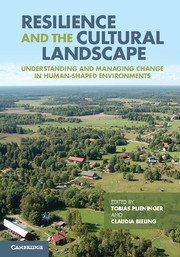 Resilience and the Cultural Landscape
Resilience and the Cultural Landscape Book contents
- Frontmatter
- Contents
- List of contributors
- Preface
- Part I Conceptualising landscapes as social–ecological systems
- 1 Connecting cultural landscapes to resilience
- 2 Landscapes as integrating frameworks for human, environmental and policy processes
- 3 From cultural landscapes to resilient social–ecological systems: transformation of a classical paradigm or a novel approach?
- 4 Conceptualising the human in cultural landscapes and resilience thinking
- 5 System or arena? Conceptual concerns around the analysis of landscape dynamics
- 6 Resilience thinking versus political ecology: understanding the dynamics of small-scale, labour-intensive farming landscapes
- Part II Analysing landscape resilience
- Part III Managing landscapes for resilience
- Part IV Perspectives for resilient landscapes
- Index
- References
3 - From cultural landscapes to resilient social–ecological systems: transformation of a classical paradigm or a novel approach?
Published online by Cambridge University Press: 05 November 2012
- Frontmatter
- Contents
- List of contributors
- Preface
- Part I Conceptualising landscapes as social–ecological systems
- 1 Connecting cultural landscapes to resilience
- 2 Landscapes as integrating frameworks for human, environmental and policy processes
- 3 From cultural landscapes to resilient social–ecological systems: transformation of a classical paradigm or a novel approach?
- 4 Conceptualising the human in cultural landscapes and resilience thinking
- 5 System or arena? Conceptual concerns around the analysis of landscape dynamics
- 6 Resilience thinking versus political ecology: understanding the dynamics of small-scale, labour-intensive farming landscapes
- Part II Analysing landscape resilience
- Part III Managing landscapes for resilience
- Part IV Perspectives for resilient landscapes
- Index
- References
Summary
Introduction
All over the world, rapid and fundamental human-made environmental changes are occurring. Correspondingly, a research focus in environmental management and sustainability science is placed on the interactions of society and environmental systems (Kates et al., 2001; Liu et al., 2007). However, despite wide consensus on the need to focus on human–nature relationships, there is much controversy about their concrete nature and how they should be conceptualised (Scholz & Brand, 2011).
We compare two approaches to the analysis and management of these relationships that are usually considered to be clearly distinct from each other. On one side is the resilience approach to social–ecological systems of the Resilience Alliance (2012), a highly influential approach in the currently emerging sustainability science. It is put forward as a novel, scientifically well-founded and unbiased, value-free approach with general applicability that is concerned with the goal to ensure sustainable development. On the other side is the original version of the cultural landscape concept, which forms the basis of classical geography and, for decades, has been very influential in nature conservation and landscape planning, particularly in Europe and possibly most strongly in Germany. This concept has been shown to be connected with a conservative ideal of the human–nature relationship and to be largely motivated by cultural, symbolic and aesthetic values of traditional cultural landscapes – notwithstanding that now it is often at odds with its supposed sustainability.
- Type
- Chapter
- Information
- Resilience and the Cultural LandscapeUnderstanding and Managing Change in Human-Shaped Environments, pp. 49 - 64Publisher: Cambridge University PressPrint publication year: 2012
References
- 10
- Cited by


